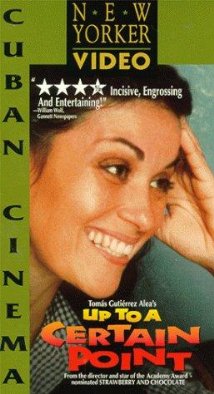
UP TO A POINT
Cuba, 1983, 70 minutes, Colour.
Oscar Alvarez, Mirta Ibarra.
Directed by Thomas Alea Guttierez.
Up To A Point is a film made by director Tomas Alea Guttierez, director of socially-minded films as Memories of Underdevelopment and The Last Supper. This is a slighter film, a film about making a film. A playwright is interested in machismo in Cuba of the '80s. With a film producer, he researches the theme in the Cuban docks, interviewing and then falling in love with an attractive dock supervisor. While the interview material highlights obvious changes in the equality of the sexes, the action of the hero in falling in love illustrates a basic macho mentality in men, even those who think they are liberal minded. The interplay of the film interviews, the preparation for the film-making and the love story make for interesting social observation. The device of showing film-makers making a film has been used effectively in Wajda's Man of Marble and the film about Northern Ireland, Acceptable Levels.
1. A Cuban film and its ethos, impact? For Cuban audiences? Universal audiences?
2. The atmosphere of Cuba in the '80s: city, port, theatre. apartments? The feel of location photography? Cuban lifestyles? Musical score, songs?
3. The focus on films and filming as a technique for portraying a story thematically? The device of interviews, research? Statements on issues? Stances dramatised? A critique of the macho theme? The quality of the writing, editing and the experience of preparation for the film? The audience as observing. and participating? The discovery that truth has many faces and facets? Final judgments of the audience about people, themes?
4. The machismo theme? Cuban preoccupations with machismo? The Spanish tradition? Equality of the sexes - and the remark that treatment of women was Stone Age? The effect of the revolution in Cuba and the lack of equality? The ordinary lifestyles - and the universal subjugation of women to men? Men and their own standards - and expectations of women and their behaviour? The interviews with the men and the stating of traditional themes? The comparisons with Oscar and Arturo. professional men and their relationships to their women? Treatment of them? Emotional machismo?
5. Oscar and Arturo's expectation of the ports - the workers, their roles, hard work and labour? Their comments on the docks and workers? The portrayal of the men at work, the meetings?
6. Lina emerging from the life of the docks, her speech for the workers and about conditions? A woman of passion? An attractive woman? Her story - family, pregnant at 17, her decision to have her child, bringing up her boy, the reaction of her own and the father's families, mixed race questions? Her leaving home, getting work? The supervisor in the docks and observing the changes throughout the 1970s? Her home. looking after her son? Her delight in training her son? Her friendship with Diego? The possibility of a change, night study, future? An enterprising woman in this Cuban world?
7. Lina as a character - feminine. charming, a woman of warmth? Her response to Oscar? Sharing with him, talking, the details of her life? Her showing her love for Claudio to him? At play, dancing? Her work experience and the discussions with Marion? Her entering into the affair? Her delight in Oscar's company? Her exasperation at his double values? The rejection of Diego, the response to his molesting her? Her being hurt by both men? Her decision to leave? Where did audience sympathies lie?
8. Oscar and his work, the success of his play, a successful artist? In Cuba? Humour and social issues? Relationship to Marion? Friendship with Arturo and his wife? The idea for the film, the research for the script? The video interviews? His attraction towards Lina. looking at her, following her? Learning from her, sharing her experiences? Did he exploit her in the research? Beginning the affair? His deceiving Marion? His honesty with Lina - and his fear of hurting Marion? His trying to get the script written, Marion's criticisms, Arturo's? Strategies for making the film? The portrait of husband and wife? His relationship with Marion, avoiding her sexual advances, headaches etc.? His spontaneity with Lina? His hurting the two women?
9. The comparison with Arturo, film producer, his age, Flora's stories about his affairs? His expectations of Oscar?
10. Diego, the relationship with Lina, the parallel with Oscar and his treatment of Lina? More obviously brutal but no less telling than Oscar?
11. Cuban exuberance? Machismo attitudes? The discussion of the relationships of men and women, their roles? Changes in attitude? Who changes whom and why?
12. The initial and final theme of the bird and the possessor not clipping the wings because of love for the bird and wanting it to be free?